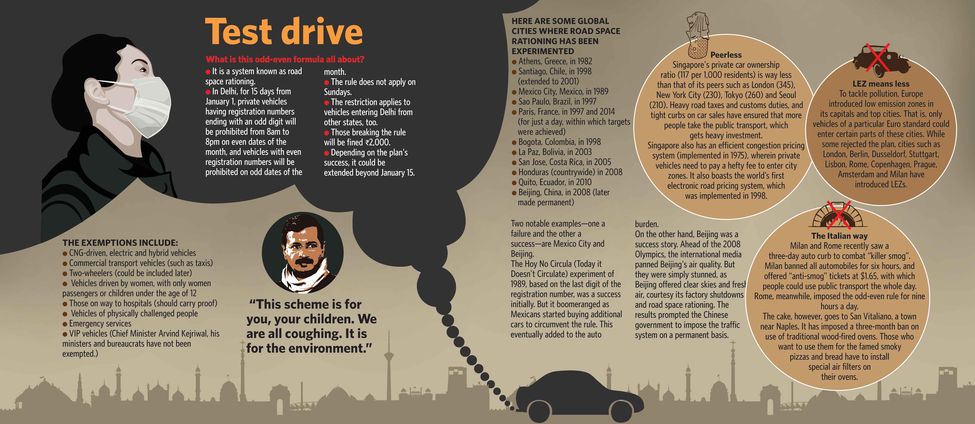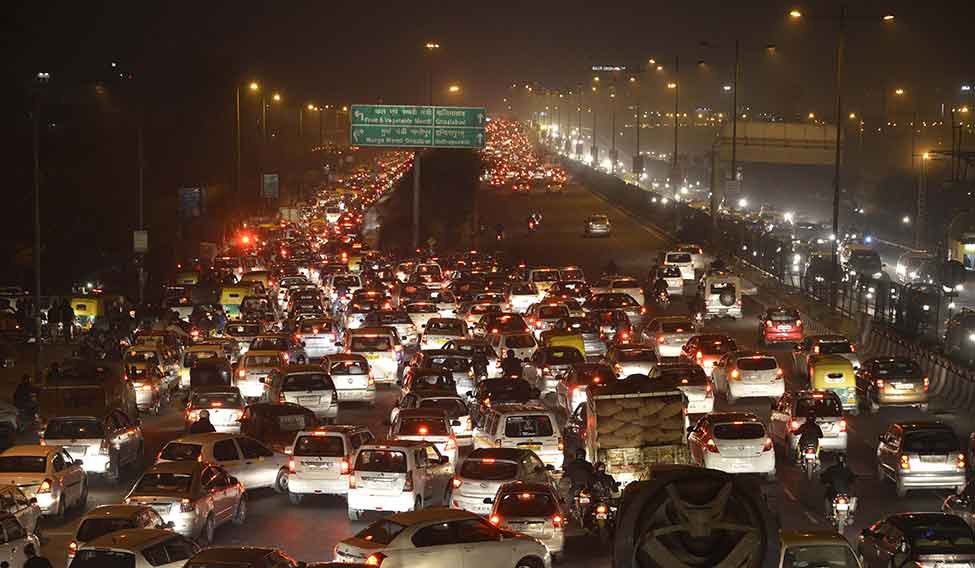Usually at odds with Narendra Modi, Delhi Chief Minister Arvind Kejriwal kept his differences aside while writing to the prime minister last month, seeking his help in implementing the odd-even traffic rule in the capital. The rule—whereby cars with even-numbered licence plates will ply on even dates and odd-numbered ones on other days barring Sundays—will have a 15-day trial run, starting from January 1. In his letter, Kejriwal urged Modi to ask his “friends and officials” to adhere to the rule. “In this period, my colleagues and I will follow the rules and carpool,” wrote Kejriwal.
Kejriwal and his government have been trying hard to get everyone on board, as many people have been sceptical of the scheme's success in reducing air pollution in Delhi. “Carpooling is not the solution and neither is adding more buses on the road,” said Prodipto Ghosh, former secretary, ministry of environment and forest. “This will still lead to increase in number of commercial vehicles. So, even though the number of private vehicles may decrease, vehicular emission may not.”
The argument put forth by Ghosh, a distinguished fellow at The Energy and Resources Institute, is valid as Kejriwal has announced exemptions for CNG-run commercial vehicles, including auto rickshaws, taxis and vehicles used for public transport. The exemptions have made transport operators, including aggregators such as Ola Cabs and BlaBlaCar think of deploying more buses or similar-sized vehicles on roads; carpooling seven- and ten-seater vehicles is also an option they are exploring. “We welcome the chief minister’s move to adopt the odd-even rule,” said Amit Singh, cofounder of Shuttl, an intra-city bus service aggregator that has got fresh $20 million funding from investors like Lightspeed, Sequoia Capital and Times Internet. “This will certainly bring more focus back on public or mass transport, and bus is what we see as the most efficient way of doing so.” The chartered bus service, which was discontinued earlier by the Sheila Dikshit government, could also see a comeback.
But activists aren't too happy with the exemptions given to commercial vehicles. They are countering the move with Kejriwal's favourite weapon—corruption charges. “This will increase corruption at regional transport offices. We all know how much clout commercial vehicle owner associations wield over RTO officials,” said Seema Trehan, a citizen rights activist. “Now people will start buying a second car or resort to paying more bribes to get their way with authorities.”
Kejriwal’s inspiration for bringing the odd-even rule comes from Beijing, which rolled out the road rationing system in 2008 before the Olympics. But before implementing the rule, China had laid 600km of subway network, twice the size of Delhi Metro. Though Mexico City and the Colombian capital of Bogota implemented this rule, both cities reported pollution increasing by 12 per cent as people bought cheap second cars.
“Seven out of ten cases of implementing odd-even rule have failed in the past. For the three that succeeded, extensive background studies were done before implementing this rule,” said Arvind Gupta, national technology head of the BJP, while attending a talk on transport solutions in Delhi. Both the Congress and the BJP have called the rule a knee-jerk reaction that would prove to be inefficient sooner than later.
Experts say that already Delhi’s public transport system is pushed to the limit. At present, Delhi has 4,700 Delhi Transport Corporation buses, which are used by nearly 45 lakh people daily. Delhi Metro has 216 trains, used by nearly 25 lakh passengers daily. “Where is the capacity in Delhi’s public transport system to carry out the odd-even order? Each CNG bus pollutes an equivalent to ten cars,” said Krishna Dev, an economist who has worked on public transport systems.
Former Delhi transport minister Ramakant Goswami said that there was a need to add last-mile connectivity for people who would use public transport. “Having rented cycle feeders to Metro stations is one example of how it can be done,” he said. Also, more coaches could be added to the Metro trains and their frequency increased, he added.
 Research: S. Neeraj Krishna; Graphics: Job P.K.
Research: S. Neeraj Krishna; Graphics: Job P.K.
Public policy experts, too, have criticised Kejriwal's plans. “If the larger intention is to reduce private vehicles on road, then you must disincentivise people to take cars on roads,” said Madhu Sivaraman, director of projects at Centre for Public Policy Research. “This could be easily achieved by peak time or congestion charges, higher vehicle registration tax and by having a good level of public transport. It can work only if there is complementary policy to public transport.” The Kochi-based public policy think tank said it would closely scrutinise Delhi's implementation of the odd-even rule and study how the system could be improved before it was replicated in other cities.
While many may say that Kejriwal wanted to keep commercial vehicle owners happy, Ramesh Agarwal, chairman of Agarwal Movers Group, thinks otherwise. He said the chief minister should give more thought to his actions.
Of 90 lakh registered vehicles in the city, only a third are privately owned vehicles. “Why do we see roads getting over clogged when there are only 30 lakh private vehicles on road? The life of the car may only be fully optimised if it is in regular use. With this system, the car owner suffers a higher depreciation value,” he said. Instead, Agarwal, owner of one of the largest fleets of commercial vehicles, wants Kejriwal to look at alternatives like fitting catalytic converters in all cars, stricter vehicle maintenance norms and more hybrid vehicles on roads.
The Delhi government, however, has brought in a slew of measures to make it easy for people to follow the rule. It has tied up with Google and Twitter to give real-time information about buses plying on 200 routes in the city. It is also planning to deploy 6,000 more buses. That, however, will take time. Schools have been asked to announce a longer winter vacation. Also, the entry of more than 50,000 trucks into Delhi will be strictly regulated.
But it is the ambiguity over the exemptions to the rule that has led to widespread debate, with lawyers and doctors, too, demanding exemptions. Apart from commercial vehicles, two-wheelers, ambulances, VVIP vehicles, government and police vehicles are also exempted. Women drivers, too, have been exempted. Perhaps, this is why the Delhi High Court has sought response from the government over its decision to exempt two-wheelers and women drivers. This comes in the wake of the draft report by IIT Kanpur on its study on pollution factors in Delhi, which states that two-wheelers and commercial vehicles account for 55 per cent of suspended particulate matter whereas cars account for less than 10 per cent.
Though people with disabilities have been exempted from the rule, Prof Komal Kamra of SGTB Khalsa College said the odd-even formula would add to her despair. “As a welfare state, the government should first come out with more disabled-friendly roads before an odd-even formula,” she said. “As someone bound to my wheelchair, I just cannot jump pavements to get to bus stands or Metro stations like everybody else can. I feel this rule will take away half of the liberty I am left with to move around,” she said.
For Delhi Police chief B.S. Bassi, the odd-even formula is a logistical nightmare. “If only the exemptions weren't there, it would have been easier to police the scheme,” he said. Also, he is wary of Aam Aadmi Party volunteers and zealous citizens offering to help the police nab offenders; it could lead to vigilantism, he said.
Despite the odds, according to Delhi home minister Satyendar Jain, the government is all set to implement the rule “till infinity”, if it succeeds.







